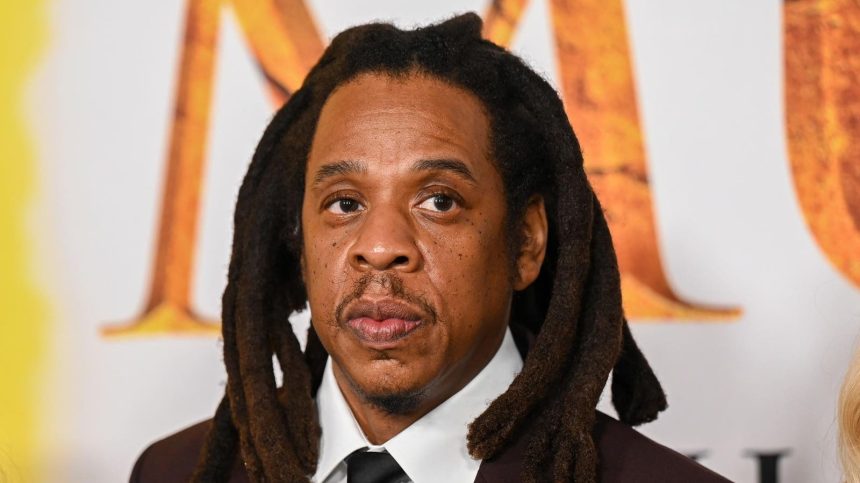The ongoing feud between rappers 50 Cent and Jay-Z escalated dramatically following a sexual assault lawsuit naming Jay-Z and 50 Cent’s longtime rival, Sean “Diddy” Combs. The lawsuit, filed by an unnamed Alabama woman, alleges that both Combs and Carter drugged and sexually assaulted her at a Video Music Awards afterparty in 2000 when she was 13 years old. While Combs was already named in the suit, the addition of Jay-Z, whose real name is Shawn Carter, ignited a firestorm of social media activity, particularly from 50 Cent, whose real name is Curtis Jackson. Jackson seized the opportunity to publicly mock Carter, leveraging the lawsuit to reignite their long-standing rivalry.
50 Cent’s mockery took various forms, ranging from social media posts to comments during a radio interview. He shared an AI-generated video depicting the arrests of Carter and Combs, adding fuel to the controversy. He also publicly questioned Carter’s silence regarding the allegations against Combs in previous months, highlighting a perceived hypocrisy. Furthermore, Jackson expressed skepticism regarding the Super Bowl halftime show, which is produced by Carter’s company, Roc Nation, suggesting that the NFL might distance itself from Carter in light of the allegations. He even joked about inquiring about the Super Bowl’s status on behalf of the scheduled headliner, Kendrick Lamar.
Jackson’s public pronouncements extended to criticizing Carter’s official denial of the allegations, which was issued through Roc Nation’s social media channels. He dismissed the statement as “combative” and likely drafted by a lawyer rather than a publicist, implying a lack of authenticity. Despite his pointed attacks, Jackson also expressed a degree of empathy for Carter, acknowledging the potential impact of the situation on Carter’s young children and the prevailing climate where accusations can overshadow facts. This subtle shift in tone suggested a complex relationship between the two rappers, marked by both animosity and a begrudging understanding.
The lawsuit and subsequent fallout played out against the backdrop of Carter’s first public appearance since the allegations surfaced. He attended the premiere of “Mufasa: The Lion King” alongside his wife Beyoncé and daughter Blue Ivy Carter. The family’s muted presence at the event, coupled with Beyoncé’s subsequent social media posts focusing solely on their daughter, further fueled speculation about the impact of the lawsuit on the Carter family. The red carpet appearance, intended to celebrate a family achievement, became overshadowed by the looming legal battle and the intensifying public scrutiny.
The legal proceedings themselves involve a complex web of accusations and denials. The lawsuit accuses Combs and Carter of serving the then-13-year-old girl a drugged drink before repeatedly assaulting her while another unnamed female celebrity watched. Carter vehemently denies these claims, characterizing the lawsuit as a malicious attempt by attorney Tony Buzbee, who has filed numerous suits against Combs. Carter’s legal team has filed a motion to compel the accuser to reveal her identity or have the case dismissed, arguing that anonymity protects frivolous and potentially damaging accusations. Carter himself issued a strong statement denouncing Buzbee and expressing support for “true victims,” while also lamenting the need to explain the situation to his children. This underscores the personal toll of the legal battle, even as he maintains his innocence.
The history between 50 Cent and Jay-Z reveals a long-standing rivalry marked by both collaboration and conflict. Early in their careers, Jackson dissed Carter in a song, prompting a retaliatory response from Carter. Despite this initial tension, they later co-headlined a tour and collaborated on music. However, the underlying rivalry persisted, with Jackson frequently criticizing Carter in interviews and social media posts, often targeting his perceived arrogance and artistic choices. This history provides context for Jackson’s current attacks, suggesting a pattern of opportunistic antagonism rather than solely a reaction to the current lawsuit. Furthermore, Jackson’s prominent role in criticizing Combs amid the sexual assault allegations adds another layer to the complex interplay of relationships and rivalries within the hip-hop community. The production of a documentary on Combs’ legal troubles by Jackson signifies a deepening of their feud, moving beyond social media jabs to a more formalized antagonism. This multi-faceted conflict underscores the intertwining of personal histories, professional competition, and legal battles within the entertainment industry.



